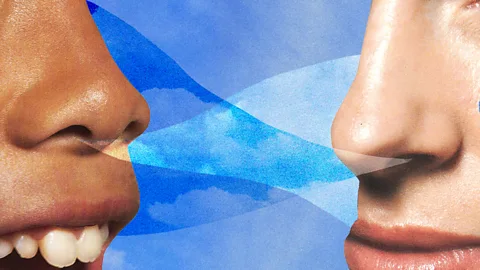For as long as I can remember, each breath felt like preparing for a swim underwater, a hard suck of air that never quite filled my lungs. Often I’d walk around with a faint whistle in my nose, praying that no one could hear it. The worst problem was a minor disability that most people refused to believe was real: something about the cruel architecture of my face made it physically impossible to blow my nose. The world was a constant sniffle.
Life cursed me with a deviated septum. My right nostril was blocked on the best of days, and I’d wind up breathing through my mouth at the slightest hint of allergies. The nasal troubles even contributed to my sleep apnoea, a breathing condition that makes you wake up multiple times at night, which apparently leaves you more likely to die of any cause. But after decades of unpleasantness, my doctor suggested surgery. The plan was to straighten my septum and reduce my turbinates – bony structures covered in a mucous membrane that condition the air as you breathe – nasal tissues that I didn’t even know I had. I was ready to try anything, so on 3 January 2025, I went under the knife.
It’s simple. Your nose is for breathing and your mouth is for eating – Ann Kearney
One month of healing later, I was the proud owner of a newly functional nose. I was able to breathe clear and deep out of both nostrils for the very first time. I learned that blowing your nose is an ecstatic pleasure, one I now enjoy as often as possible. And though my sleep apnoea wasn’t cured, it did improve. The procedure probably led to a variety of other blessings, too. It turns out there are some surprising benefits to breathing out of your nose, and you don’t necessarily need surgery to enjoy them. In fact, nose breathing might even improve your mental health.
Your personal air filter
The most obvious benefit to nasal breathing comes from those turbinates, according to Jacquelyn Callander, an ear, nose and throat doctor at the University of California, San Francisco. “They’re kind of our primary mediator for warming and humidifying air, and that’s incredibly important. But they also act as a filtration system,” Callander says.
 Serenity Strull/ BBC
Serenity Strull/ BBCTogether with your nose hairs, your hard working turbinates sift through dust, bacteria, viruses and more, an advantage you won’t get from breathing through your mouth. “They can be the first line of defence for your immune system,” she says.
It’s not just the merits of nose breathing to consider, however. Breathing through your mouth has consequences. “There’s a lot of research that associates mouth breathing with oral health problems,” says Ann Kearney, a speech-language pathologist at Stanford University Medical Center who studies sleep and swallowing issues.